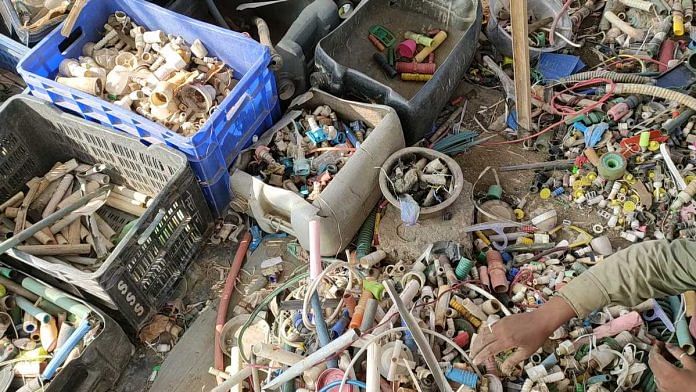New Delhi: The Ministry of Environment, Forest and Climate Change notified new guidelines on single-use plastic waste management Thursday, making it mandatory for producers, importers and brand-owners to recycle up to 50 per cent of the plastic they use or produce over the next three years.
The notification sets gradually scaled up targets for plastic recycling. Not meeting the annual targets will invite fine. The fine will, however, not absolve companies from meeting their targets.
According to a ministry statement released Friday, the Guidelines on Extended Producers Responsibility (EPR) — which come into effect from 1 July this year — are important steps for reducing pollution caused due to littered plastic waste in the country.
Union Minister Bhupender Yadav said on Twitter that the guidelines will promote development of new alternatives to plastics and provide a roadmap for businesses to move towards sustainable plastic packaging.
Taking forward the clarion call given by PM Shri @narendramodi ji to eliminate single-use plastics, @moefcc has notified comprehensive Guidelines on Extended Producers Responsibility on plastic packaging.https://t.co/BtONCGnaLH
— Bhupender Yadav (@byadavbjp) February 17, 2022
Also read: Kulhads aren’t exactly the eco-friendly alternative to plastic cups you think they are
Category-based recycling criteria
The notification classifies plastics into four categories. The first category includes rigid plastic packaging. The new guidelines mandate the reuse of rigid plastic packaging material to reduce the use of fresh plastic.
The second category includes single layer or multilayer packaging, plastic sheets and covers made of plastic sheet, carry bags, plastic sachet or pouches. The third category comprises multi-layered plastic packaging — which has at least one layer of plastic and at least one layer of material other than plastic. Carry bags and plastic sheets used for packaging that are made of compostable plastics fall under the fourth category in the notification.
The ministry has set different recycling targets for each category for the financial years 2024-25, 2025-26, 2026-27, 2027-28 and onwards.
For example, for Category 1 and 4 plastics, the targets set for 2024-25 is 50 per cent of the plastic produced, imported or used. By 2027-28, this target will go up to 80 per cent.
On the other hand, plastics included in category 2 and 3 will have have targets of 30 per cent recycling over the next three years.
The guidelines also state that only those plastics that can not be recycled can be sent for end of life disposal such as road construction, waste to energy, waste to oil and cement kilns.
Meeting annual targets
The notification also defines the responsibilities of producers, importers and brand-owners with respect to plastic packaging, recycling, use of recycled plastic content and end of life disposal. All such people will have to submit details of recycling certificates obtained from registered recyclers by 30 June every year, while filing annual returns on an online portal.
The details will be cross-checked, and incase of a discrepancy, only the lower figure would be considered towards fulfilment of EPR obligation of producers, importers and brand-owners.
The recycling certificates shall be verified by the Central Pollution Control Board or State Pollution Control Board or the Pollution Control Committee, as the case may be.
CPCB will establish a centralised online portal for the registration, as well as filing of annual returns by 31 March. This portal would then act as a data repository on plastic recycling and management.
The notification also stated that producers, importers and brand owners who do not fullfill their EPR targets will be fined with an environmental compensation, which will then be used for protecting the environment and preventing pollution.
Moreover, payment of fines will not absolve the polluter of their obligations. The unfulfilled EPR targets for a particular year will be carried forward to the next year, for a period of three years.
The government has also announced the setting up of a committee under the CPCB chairman, to recommend measures to the environment ministry for effective implementation of EPR. This committee will have representatives from the Ministry of Housing and Urban Affairs, Ministry of Micro, Small and Medium Enterprises, Department of Drinking Water and Sanitation, Department of Chemical and Petrochemicals; Bureau of Indian Standards, three State Pollution Control Boards or Pollution Control Committees, Central Institute of Plastic Engineering and Technology (CIPET), National Environmental Engineering Research Institute (NEERI), and three industry associations, along with any other invitee decided by the chairperson of the committee.
The committee will not only monitor the implementations of EPR targets, but also guide and supervise the online portal.
(Edited by Poulomi Banerjee)
Also read: Worried about carbon footprint? Indian start-up’s ‘recycled’ shoes may put your mind at ease



